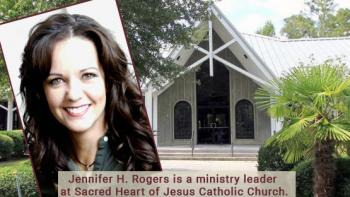
Alumna Jennifer Rogers is involved in two ministries in her parish: Food for Seniors and Welcome Home, a jail/prison and re-entry ministry. Both grew out of a data-gathering and testing process that Jennifer led. “It has been wonderful to see the response by our parish-community once these ministries hit the ground running!” she says.
Jennifer developed these ministries by identifying the current situation, soliciting information and ideas from stakeholders, and implementing next steps and ongoing evaluation. For both ministries, she started by asking open-ended questions of parish leaders and elders from the Knights of Columbus and Legion of Mary about what the parish needed and worked with clergy to discern how they might as a team implement new initiatives to serve those needs identified by the congregation.
The first ministry born of those conversations was a Food for Seniors ministry. It was discovered that two elderly volunteers were driving to other cities to pick up commodity boxes on a monthly basis for a handful of seniors who were unable to pick up the boxes for themselves. By partnering with the Knights of Columbus, the parish undertook a new application campaign to grow the number of seniors receiving monthly food supplies, and the Knights agreed to provide delivery to those who lacked transportation. Over the course of several months, Jennifer and other ministry leaders recognized that many of the community members could benefit from this program, so they worked with Catholic Charities to establish their own food-site, enabling them to serve more seniors on a local basis. Last fall, the ministry began hosting its own Food for Seniors distribution site, just in time for Thanksgiving! Rather than strangers greeting the seniors, local volunteers greet them as fellow members of the Lacombe community, and often as members of their shared parish.
 The second ministry that arose from Jennifer’s efforts was a jail/prison and re-entry ministry called “Welcome Home.” Jennifer had previous experience volunteering with incarcerated individuals, but had never been involved in a parish-based effort. Based on dialogue with parish elders regarding the impact of mass incarceration on the local community, the group chose to focus its efforts on incarcerated folks from the local community with the goal of bridging the gap between jail/prison walls and church walls. The Covid-19 pandemic put on hold weekly visits to the jail, but a grant and private donations covered the fees charged by the corrections facilities for video- and messaging-technology. Jennifer and the ministry group also decided to start a quarterly newsletter called The Good News, which contains reflections by the incarcerated people served by the ministry, giving them a voice and presence in the parish. Jennifer explains the reach of the program, “Gathering their reflections and coordinating the circulation of the newsletter has given us all an opportunity to work together beyond jail/prison walls and church walls, and we are grateful to have found ways to keep the ministry going through the pandemic. As our incarcerated loved ones return home to us, we coordinate their return with Catholic Charities and other related service-partners who might be able to offer programs and services that our parish might not be in a position to provide directly.”
The second ministry that arose from Jennifer’s efforts was a jail/prison and re-entry ministry called “Welcome Home.” Jennifer had previous experience volunteering with incarcerated individuals, but had never been involved in a parish-based effort. Based on dialogue with parish elders regarding the impact of mass incarceration on the local community, the group chose to focus its efforts on incarcerated folks from the local community with the goal of bridging the gap between jail/prison walls and church walls. The Covid-19 pandemic put on hold weekly visits to the jail, but a grant and private donations covered the fees charged by the corrections facilities for video- and messaging-technology. Jennifer and the ministry group also decided to start a quarterly newsletter called The Good News, which contains reflections by the incarcerated people served by the ministry, giving them a voice and presence in the parish. Jennifer explains the reach of the program, “Gathering their reflections and coordinating the circulation of the newsletter has given us all an opportunity to work together beyond jail/prison walls and church walls, and we are grateful to have found ways to keep the ministry going through the pandemic. As our incarcerated loved ones return home to us, we coordinate their return with Catholic Charities and other related service-partners who might be able to offer programs and services that our parish might not be in a position to provide directly.”
Considering the impact of her LIM studies on this ministry praxis, Jennifer said,
The LIM program, and the entire LIM family, has influenced every aspect of my involvement in ministry. For example, it was through a LIM professor who knew about my concern for racial equity and justice that I was introduced to the Office of Racial Harmony (now the Racial Harmony Commission) for the Archdiocese of New Orleans, for which I have been a member of the Implementation Committee for several years. It was also because of my LIM experience that I grew in my faith formation and found the parish that I now call home. And it was because of the praxis paper in my final semester that I was able to synthesize all of the LIM teachings on practical theology to ground what it means to be part of a community in service to each other and in relational encounter with our brothers and sisters to whom we are accountable in love. Learning the LIM model in how to identify an issue or challenge, how to test preconceived notions about it, actively listen to other resources and be open to new information, and then take action based on the fruits of that discernment process are the reason these new ministries grew from “idea phase” to reality!
Congratulations to Jennifer on her leadership in growing these ministries and fostering their continued development!
